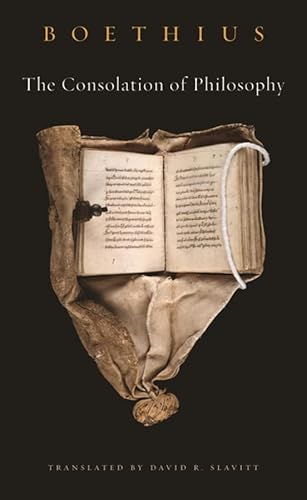The Consolation of Philosophy
Boethius
BOOK REVIEW

In the shadowy hallways of intellectual history, few works resonate with such profound depth and urgency as The Consolation of Philosophy by Boethius. As you plunge into its pages, you find yourself nestled within a dialogue that transcends time-written in the early sixth century, yet it reverberates like a thunderclap through the corridors of modern existentialism. This isn't merely a book; it's a lifeline thrown into the churning seas of despair, a philosophical refuge that implores you to rethink your own notions of happiness, fortune, and the relentless grasp of fate.
Boethius, a Roman philosopher and statesman, faced dire circumstances that many of us only encounter in nightmares. Imprisoned and awaiting execution, he was stripped of his earthly power and admired status. Yet from this abyss of despair, Boethius crafted a dialogue with Lady Philosophy herself-a divine figure who embodies wisdom and clarity. This interaction is nothing short of electrifying, igniting the hope that lies dormant in each of us. When you read Boethius's heartfelt laments and piercing inquiries, you can almost hear your own doubts echoing back, urging you to confront the tumultuous nature of human existence.
The genius of Boethius lies not merely in his eloquent prose, but in the heart of his reflections. He argues that true happiness cannot be tethered to the fickle gifts of fortune. Wealth, status, and even personal relationships are as fleeting as autumn leaves. Instead, he beckons you towards a more profound truth-the quest for wisdom and the virtuous life, where happiness is an inward journey rather than an external chase. This is a radical proposition that challenges the very fabric of our societal norms. Do we not often find ourselves ensnared in the clutches of consumerism, equating success with material possessions? Boethius, through Lady Philosophy, shatters this illusion, compelling you to seek a richer understanding of your purpose.
Let us consider the context in which Boethius penned these words. The Roman Empire was crumbling, and philosophical discourse was shifting from the grand forums to intimate dialogues. His work became a beacon for those grappling with the disillusionment of their era-an era not unlike our own, where uncertainty looms large and the search for meaning feels increasingly elusive. The reflections in The Consolation of Philosophy possess a timeless quality, allowing readers across generations to draw strength and resilience from Boethius's despair.
Reader reactions to Boethius's meditative approach often reflect a dichotomy of admiration and frustration. Some praise the text for its sheer brilliance, lauding its ability to guide through the labyrinth of despair towards the light of enlightenment. Others, however, find the philosophical musings burdensome, suggesting that it can feel distant or overly abstract. Yet isn't that the essence of philosophy? To challenge, to provoke, and to invite introspection, even at the cost of discomfort? This tension is what breathes life into the work, invigorating the reader's journey towards understanding.
But don't just take my word for it. The influences radiating from Boethius's treatise are undeniable. Think of the luminaries inspired by his thoughts-Alfred the Great, Dante Alighieri, and even more modern philosophers who wrestled with the conundrums raised within his pages. When you stand on the shoulders of giants like these, you realize that the quest for meaning is a collective journey, one that binds us all through the fabric of time.
In the final analysis, The Consolation of Philosophy is not merely a philosophical text; it is a clarion call. It demands engagement, beckoning you to peel back the layers of superficiality and confront the more profound questions tethered to your existence. The brilliance of Boethius lies not only in his ability to articulate the human condition but in his unwavering belief that through philosophy, we can find solace even amidst chaos.
As you navigate the tumult of your own life, let this work echo in your thoughts. Reflections on fortune, suffering, and the quest for inner peace proliferate within its pages, challenging you not just to read, but to act-an invitation to transform your understanding and perhaps your very existence. When all else falls away, in the wake of despair, the humbling wisdom of Boethius is a companion to guide you home. 🌟
📖 The Consolation of Philosophy
✍ by Boethius
🧾 208 pages
2010
#consolation #philosophy #boethius #Boethius